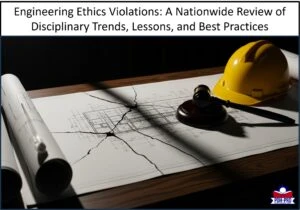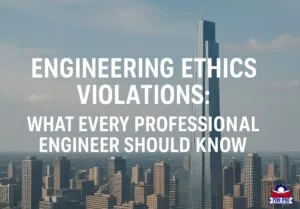 Written by: Jordan Ellis, PE
Written by: Jordan Ellis, PE
Published: June 19, 2025
When we think about engineering, we often focus on technical skills, innovative designs, and solving complex problems. But behind every successful project is something less visible yet just as important – ethics. Every licensed engineer in the United States is bound by a professional code of conduct, and when that trust is broken, the consequences can be serious.
This article offers a nationwide perspective on engineering ethics violations, pulling together real-world cases from across the country. Whether it’s unlicensed practice, falsifying documents, or failing to meet continuing education requirements, these disciplinary actions reveal patterns that every engineer should understand.
We’ve analyzed board decisions, disciplinary summaries, and ethics codes from all 50 states to identify the most common violations, highlight trends over time, and provide lessons learned from real enforcement cases. From Florida to Oregon, Texas to New York, each state has its own rules-but the message is the same: ethics matter.
If you’re a professional engineer, an engineering student, or someone who manages licensed staff, this guide will help you stay informed, avoid common pitfalls, and maintain the high standards the profession demands. You’ll also find links to state-specific summaries that provide even more detail about what can go wrong-and how to stay on the right path.
Why Engineers Get Disciplined
Professional engineers are expected to uphold not only technical standards but also ethical and legal responsibilities. When those expectations are not met, state licensing boards have the authority to take disciplinary action. These actions can include fines, license suspension, license revocation, mandated ethics training, or public reprimands.
While the specific language and enforcement processes vary by state, the reasons for discipline are strikingly consistent. Based on our review of hundreds of disciplinary cases across the United States, the most common violations fall into the categories below:
1. Unlicensed Practice
Practicing engineering without an active license-or never having been licensed—is one of the most serious and frequently cited violations. This includes engineers who let their license lapse but continue to offer services, or individuals who falsely present themselves as licensed professionals.
2. Continuing Education Violations
Many states require licensed engineers to complete a set number of continuing education or professional development hours (PDHs) every renewal cycle. Violations in this area include failing to complete the required hours, falsifying CE records, or submitting courses that don’t meet board standards.
3. Misrepresentation or Fraud
This includes falsifying engineering documents, improperly using another engineer’s seal, or submitting work that was not actually performed under the licensee’s direct supervision. In several cases, engineers impersonated others or claimed credentials they didn’t earn.
4. Negligence and Incompetence
Engineers can be disciplined for submitting deficient or unsafe designs, making serious technical errors, or providing services outside their area of competence. Gross negligence-such as knowingly ignoring safety codes or causing harm through inaction—can lead to license revocation.
5. Failure to Report Discipline in Another State
Many states require engineers to report if they’ve been disciplined elsewhere. Failure to disclose these actions—whether intentional or not-can result in additional penalties and suspension.
6. Ethics Violations and Conflicts of Interest
This broad category includes accepting projects with conflicts of interest, breaching confidentiality, or engaging in dishonest behavior that reflects poorly on the profession. Even if no technical rule is broken, unethical conduct can still result in formal discipline.
The Most Common Ethics Violations
 Ethics violations may vary in detail, but many fall into recognizable patterns. By reviewing disciplinary actions across multiple state boards, we’ve identified the most frequent types of ethical violations that result in fines, suspensions, or loss of licensure. These trends offer valuable insight into where engineers are most vulnerable, and what to avoid.
Ethics violations may vary in detail, but many fall into recognizable patterns. By reviewing disciplinary actions across multiple state boards, we’ve identified the most frequent types of ethical violations that result in fines, suspensions, or loss of licensure. These trends offer valuable insight into where engineers are most vulnerable, and what to avoid.
Below are the most common ethics-related violations along with brief explanations and real-world context.
1. Practicing Without a License
This includes engineers who:
- Let their license lapse but continued working
- Practiced in a state where they weren’t licensed
- Claimed to be licensed without ever holding valid credentials
Example: In Oregon, several engineers were fined up to $6,000 for working while their licenses were expired or inactive.
2. Failure to Complete or Report Continuing Education
Engineers must maintain their technical competency through continuing education. Violations include:
- Not completing required PDHs
- Submitting falsified or incomplete CE records
- Failing to retain documentation for audits
Example: In Florida and Texas, engineers have been fined or reprimanded for claiming hours they didn’t complete or submitting outdated course content.
3. Misuse of Seal or Title
Improperly using a PE seal, signing off on work not done under your supervision, or allowing others to use your credentials violates most state engineering laws.
Example: In Pennsylvania, one engineer was disciplined for sealing documents prepared by someone else without reviewing or supervising the work.
4. Falsification and Misrepresentation
This can include:
- Lying about qualifications or work experience
- Submitting forged documents
- Impersonating another engineer
Example: In New York, multiple cases involved engineers who misrepresented their licensure or experience on official filings.
5. Negligence or Gross Incompetence
Examples include:
- Submitting structurally unsound designs
- Repeated errors in calculations or omissions in critical reports
- Failing to meet health and safety standards
Example: In Texas, an engineer’s repeated design errors on a retaining wall led to disciplinary action and an ethics course requirement.
6. Conflict of Interest
Failing to disclose relationships or financial interests that affect impartial judgment is a recurring ethics violation.
Example: A multi-state case involved an engineer working on public contracts while holding an undisclosed interest in a subcontracting firm.
Ethics Violations at a Glance (Summary Table)
| Violation Type | Typical Penalty Range | Common Across States |
| Practicing Without a License | $1,000 – $6,000 | Yes |
| Continuing Education Violations | $500 – $2,000 | Yes |
| Seal Misuse or Unauthorized Use | $1,500 – $5,000 | Yes |
| Falsification or Misrepresentation | $2,000 – $13,000 | Yes |
| Negligence or Incompetence | $1,000 – $10,000+ | Yes |
| Conflict of Interest | Varies, often suspension | Yes |
Case Studies: Real Violations, Real Lessons
Nothing illustrates the importance of ethics like real-world examples. Across the country, state engineering boards have published dozens of disciplinary actions that show how quickly a lapse in judgment can jeopardize a license, a career, and public trust.
Below are a few representative case studies drawn from our analysis of public board records. Each highlights a different type of violation and the consequences that followed.
Case 1: Falsifying Engineering Credentials
State: New York
Violation: Misrepresentation of license status
Summary: An individual presented himself as a licensed professional engineer on proposals and technical reports submitted to a public agency. Upon investigation, the New York Board found that he had never held a PE license in the state.
Penalty: Cease and desist order, $10,000 fine, and a permanent record of the violation
Lesson: Always verify your license status before offering or performing engineering services. Misrepresenting your credentials can lead to lasting damage to your reputation and professional standing.
Case 2: Unlicensed Practice Across State Lines
States: Oregon and Washington
Violation: Failure to report out-of-state discipline
Summary: An engineer disciplined in Washington for practicing on an expired license failed to notify the Oregon board as required. Oregon launched its own investigation after being notified by Washington.
Penalty: $1,500 civil penalty in Oregon in addition to previous penalties in Washington
Lesson: Many states require engineers to self-report disciplinary actions taken elsewhere. Failing to do so can compound the consequences.
Case 3: Continuing Education Shortfall
State: Florida
Violation: Failure to complete required PDH hours
Summary: During a random audit, a PE was unable to produce records verifying compliance with Florida’s CE requirements. Investigation showed the engineer had not completed any valid courses during the renewal period.
Penalty: $1,000 fine, completion of a 4-hour ethics course, and additional CE hours required
Lesson: Maintain accurate CE records and ensure your courses meet your state’s requirements. Most states can audit you for up to four years after renewal.
Case 4: Stamping Work Not Under Direct Supervision
State: Pennsylvania
Violation: Improper use of PE seal
Summary: A PE sealed and submitted design drawings that were prepared by an unlicensed contractor. The PE did not review the work or provide supervision.
Penalty: $1,850 fine and public reprimand
Lesson: Only seal documents you have directly prepared or supervised. Serving as a “rubber stamp” is a serious violation of professional duty.
Case 5: Multi-State Conflict of Interest
States: Texas, California, and Georgia
Violation: Unreported financial interest in a subcontractor on public projects
Summary: A PE was found to have awarded subcontracts to a firm in which he held partial ownership while acting as the design lead for a public client.
Penalty: Suspension in Texas and reciprocal discipline in California and Georgia
Lesson: Disclose financial relationships that could influence your decisions. A perceived conflict can be just as damaging as an actual one.
When One Violation Becomes Many: The Risks of Multi-State Discipline
For engineers licensed in more than one state, a single ethics violation can quickly snowball. What begins as a disciplinary action in one jurisdiction often triggers investigations-and penalties-in others. This concept, known as reciprocal discipline, is becoming more common as state boards share information and expand their enforcement reach.
How It Happens
Most state licensing boards require engineers to:
- Report any disciplinary action taken in another state
- Maintain good standing in all jurisdictions where they hold a license
Failing to disclose a violation, or continuing to practice without informing other states, can result in additional charges such as misrepresentation, unlicensed practice, or failure to comply with board rules.
Case in Point: Multi-State Ethics Violation
An engineer was disciplined in one state for submitting falsified documentation related to project qualifications. Rather than report the violation to the other states where he held licenses, the engineer continued practicing as if nothing had happened.
When the original disciplinary action became public, several other states opened their own investigations. The result: multiple license suspensions, thousands of dollars in fines, and a permanent stain on his professional record.
Lesson: When you hold multiple licenses, you are held to multiple sets of rules. Transparency and timely self-reporting are critical to protecting your professional standing.
What Engineers Need to Know
- Every state has the authority to take independent action based on another state’s disciplinary decision.
- Failing to report an out-of-state violation is often treated as a second offense.
- Even minor violations, such as CE deficiencies, can lead to multi-state enforcement if not disclosed properly.
- NCEES records are often used to share disciplinary data between states, so avoiding disclosure is not a viable strategy.
State-by-State Reviews of Engineering Ethics Violations
While ethics principles are universal, each state enforces its rules a little differently. Some publish detailed disciplinary reports every quarter, while others release summaries annually. The types of violations are often similar, unlicensed practice, CEU violations, misrepresentation, but the penalties and reporting standards vary widely.
To help you stay informed and compliant, we’ve compiled a growing series of state-level articles that break down:
- The most common violations in each state
- Real disciplinary actions taken by state boards
- Penalty ranges and enforcement trends
- Lessons engineers can apply to their own practice
Below are direct links to the state reviews published so far:
- Pennsylvania PE Disciplinary Actions: What Engineers Need to Know (2023–2025)
- Oregon PE Board Disciplinary Actions: Real Cases, Real Lessons for Professional Engineers
- Engineering Ethics in Texas: What We Can Learn from Recent Board Disciplinary Actions
- Florida PE Disciplinary Cases: Lessons from Recent Board Actions
- Engineering Ethics in Practice: A 10-Year Review of Disciplinary Actions in New York (2016–2025)
- Case Study: A Multi-State Ethics Violation and Its Consequences
- What Are the Most Common Ethics Violations for Professional Engineers?
Tips to Avoid Ethics Violations
Avoiding disciplinary action isn’t just about knowing the rules, it’s about building habits that reflect professionalism, integrity, and sound judgment in every aspect of your engineering work. Most ethics violations are preventable. They often result from complacency, poor documentation, or a misunderstanding of responsibilities, not malicious intent.
Below are practical tips every engineer should follow to stay compliant and protect their license.
1. Know Your State’s Rules and Renewal Requirements
- Each state board has its own licensing, continuing education, and reporting rules.
- Review your state’s PE act and board rules annually to stay current.
Pro tip: Don’t assume rules are the same across states if you hold multiple licenses.
2. Keep Your License Active and Accurate
- Set calendar reminders for renewal deadlines.
- Ensure your contact information is up to date with each board.
- Don’t offer services in a state where your license is inactive or expired.
3. Track Your Continuing Education
- Maintain records of completed PDH hours, certificates, and course outlines for at least 4–6 years (or longer if your state requires it).
- Only take courses that are relevant and board-compliant.
- Be prepared for audits at any time.
4. Only Seal Work You Directly Supervise
- Never stamp or sign plans you didn’t prepare or oversee directly.
- Understand what “responsible charge” means in your state.
5. Disclose Conflicts of Interest
- Be transparent with clients and employers about any financial or professional interests that could affect your impartiality.
- When in doubt, disclose.
6. Report Disciplinary Actions in Other States
- If you’re disciplined in one state, most others require that you report it.
- Failing to report is often treated as a separate violation.
7. Stay Within Your Area of Competence
- Don’t take on work in unfamiliar disciplines just to keep a project or please a client.
- Refer work to qualified colleagues or seek supervision if required.
8. Refresh Your Ethics Training
- Take an ethics course during each renewal cycle—even if it’s not required in your state.
- Use real-world case studies (like the ones in this series) to sharpen your judgment.
Conclusion: Ethics Is the Foundation of the Profession
Engineering is built on trust. Whether designing a bridge, reviewing construction plans, or certifying a safety system, engineers are responsible for protecting the health, safety, and welfare of the public. That responsibility extends beyond technical knowledge. It requires ethical conduct, accountability, and sound professional judgment.
This nationwide review of disciplinary actions shows that ethics violations happen across every state, every discipline, and every level of experience. Most cases stem from preventable errors: failing to renew a license, ignoring continuing education rules, or signing off on work outside one’s area of competence. Others reflect more serious breaches, such as fraud, misrepresentation, or negligence.
